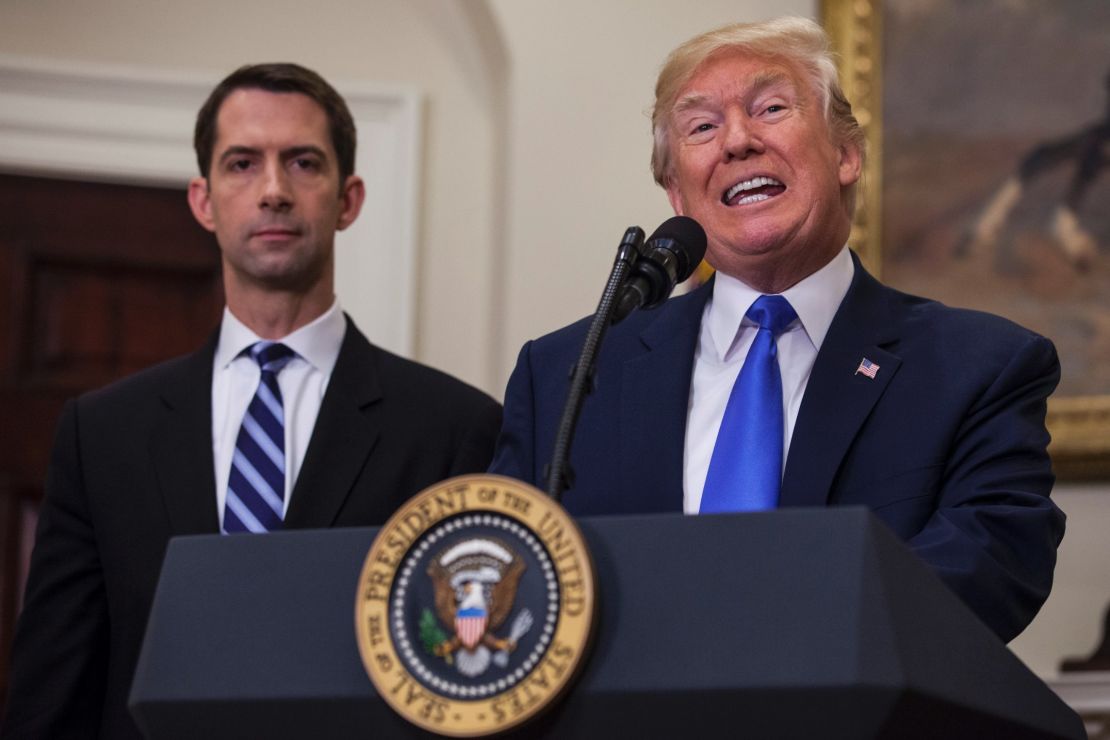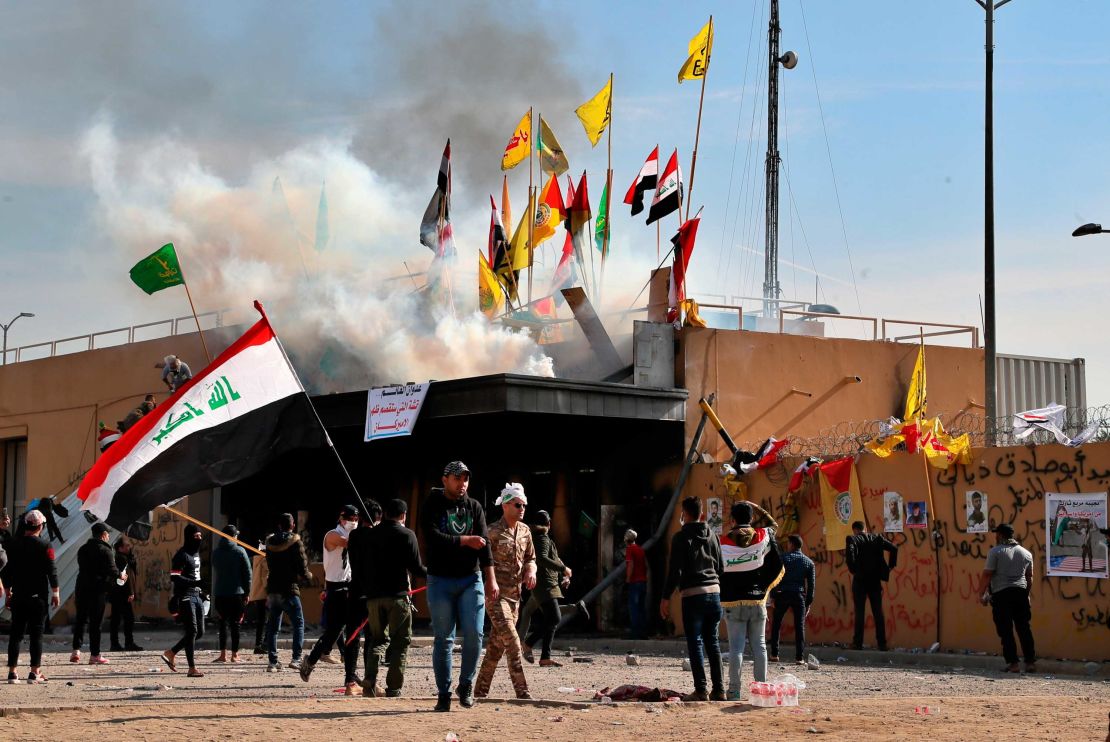On the night of June 19, President Donald Trump approved and then abruptly called off military strikes against Iran in retaliation for a downed US surveillance drone.
The move, which came after months of escalating tensions, confused and frustrated many of the President’s more hawkish advisers and allies, who had hoped he would take a stronger stand against Iran and were concerned that his pull back would send a signal of weakness and only embolden the government in Tehran.
In the six months since, many of those hawks have largely felt justified in their concern as Iran has continued to attack and threaten the United States and its allies in the region, according to two Republicans who acknowledged they were troubled by what they had come to believe were empty words from Trump. Through private conversations and carefully calibrated public statements, they have tried to push the President to match his often tough rhetoric toward Iran with equally tough action.
The next time an opportunity arose to strike back at Iran, the hawks hoped, Trump would be primed to act.
That strategy appears to have paid off after Trump gave the go ahead to target Qasem Soleimani, the top military leader in Iran, who was killed last week in a US drone strike near the Baghdad airport.
Along with the successful October raid to take out the head of ISIS, Abu Bakr al-Baghdadi, Trump’s decision to kill Soleimani has many GOP hawks expressing confidence that they have begun to win over the President in the struggle between his isolationist instincts and his aggressive impulses.
“He’s learning that Americans like it when America acts like a superpower,” one Republican congressional aide told CNN.
Hawks winning over Trump

When it comes to Iran, Sens. Tom Cotton and Lindsey Graham have consistently advised Trump that the consequence of inaction would only make Iran’s behavior worse. One GOP aide told CNN that the message from these lawmakers was that this is a region that “understands force as a language and you have to be able to speak it if you want to have an impact on the outcome of events.”
Secretary of State Mike Pompeo, who had supported the strike on Iran in June, has been a particularly strong voice for taking out Soleimani as a deterrence.
And the nonpolitical military leaders, particularly Gen. Mark Milley, the chairman of the Joint Chiefs of Staff, backed up the hawks’ perspective in the days leading up to the strike and after, echoing the sentiment that the US could not afford to do nothing, according to congressional aides and a person familiar with internal discussions within the administration on Iran.
The fact that the strike was carried out by the US military rather than the intelligence community, as part of a covert operation, offers some indication that Trump embraced the idea he needed to send a clear message of strength to Iran.
A covert operation, however, could have achieved the same outcome while allowing the Trump administration to maintain some level of strategic deniability, former intelligence officials told CNN. Instead, Trump opted to allow the military to take the lead – a move that suggests he fully intended to take credit for the killing given the order had presidential authorization.
That was part of the pitch Cotton and others have made to Trump privately in recent months to send a clear message to Iran with a show of US force – an argument that was buoyed by the fact that the President was unhappy with the negative coverage he received for his lack of response to the drone downing in June.
All these factors appear to have beaten back the advances of Sen. Rand Paul, the Kentucky Republican who encourages the President’s isolationist instincts. Paul admitted his disadvantage in a Friday interview on Fox News, lamenting that Trump was “getting unfortunate counsel” from Iran hawks.
The hawkish Republican aide noted that two recent decisions on which Trump sided with Paul – the withdrawal of US forces from Syria and the subsequent abandonment of Kurdish forces there – resulted in significant blowback from most of his other allies in Washington and with his base. Trump, the aide asserted, was starting to realize the benefits of siding with the hawks.
Impulse to protect the troops

According to a Republican congressional source familiar with the Trump’s decision making, the past week of aggression - the attack on December 27 by an Iranian-backed militia group in Iraq that injured four US servicemen and killed an American civilian contractor had a particularly strong impact on the President.
Following that attack, and the subsequent protests at the US embassy in Baghdad, Trump did not have to be talked into the strike by advisers, according to the Republican source.
While in the past, the source acknowledged that the President “has been reluctant to take military action,” in this case, the killing of an American contractor, the wounding of others, and the subsequent embassy protests “crossed his line.” His advisers also pointed out to the President that if he “didn’t respond now, they (Iran) will continue to cross it.”
“I am very confident he was not reluctant,” said the source. When Trump finally gets ready to act, the source added, “you can’t out escalate him.”
In an interview with CNN Friday morning, Pompeo cited “imminent threats to American lives” in the region as a primary reason for the timing of the attack, but it’s also clear that the strike was at least being considered for several days beforehand. Trump himself weighed the decision for a few days, officials told CNN, while at Mar-a-Lago. Graham, who golfed with the President during that time, later said Trump informed him of the plans.
After a meeting Sunday in Mar-a-Lago where Trump was briefed by senior members of his national security team on options regarding Iran, some officials emerged surprised the President chose to target Soleimani, according to a source familiar with the briefing.
The officials who briefed Trump included Defense Secretary Mark Esper, Pompeo, National Security Adviser Robert O’Brien and Milley.
The source said that some aides expected Trump to pick a less risky option, but once presented with the choice of targeting Soleimani he remained intent on going forward.
When asked about whether there was intelligence that Iranian attacks were imminent, the Republican congressional source said top administration officials confirmed there was “no doubt he was there to plan attacks against the US,” referring to Soleimani.
As to the timing of the attack and whether it was politically motivated, the source said, “If an American hadn’t died, I don’t think any of this would have happened.”
On Saturday, Trump drew a significant red line in a three-part tweet, vowing specific military action against Iran if it “strikes any Americans, or American assets.”
“We have … targeted 52 Iranian sites (representing the 52 American hostages taken by Iran many years ago), some at a very high level & important to Iran & the Iranian culture” and “if Iran strikes any Americans, or American assets… Iran itself, WILL BE HIT VERY FAST AND VERY HARD,” Trump wrote.
Israel as a model
In the previous year, Trump has “acted with restraint” regarding Iran, Retired Army Maj. Gen. James “Spider” Marks, told CNN. This series of events, however, changed the administration’s calculus. That’s when the chance to hit a “known, high-valued target” like Soleimani arose.
“This suddenly became an opportunity, and the President took it,” said Marks, a CNN contributor. “The intel was pretty doggone good.”
Mark Dubowitz, the chief executive at the Foundation for Defense of Democracies, a Washington think tank that takes a hawkish view toward Iran, said the idea of taking out Soleimani has long been an option for the US government. Increasingly within the administration, it had become a viable one.
“I think this was months in the making, not days or hours in the making,” Dubowitz told CNN.
Dubowitz also speculated that the President may have been influenced by the example set by Israel’s defense forces. Over the past several months, the Israelis have successfully destroyed Quds Force targets in Syria, including a possible headquarters for Solomeini’s operation in that country.
“To what extent has Israel’s success at going after the Quds force provided Trump with the confidence that he could do that too and handle the blowback?” Dubowitz said. “If the Israelis can do it, why can’t we?”

























